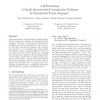Free Online Productivity Tools
i2Speak
i2Symbol
i2OCR
iTex2Img
iWeb2Print
iWeb2Shot
i2Type
iPdf2Split
iPdf2Merge
i2Bopomofo
i2Arabic
i2Style
i2Image
i2PDF
iLatex2Rtf
Sci2ools
POPL
1994
ACM
1994
ACM
Call Forwarding: A Simple Interprocedural Optimization Technique for Dynamically Typed Languages
This paper discusses call forwarding, a simple interprocedural optimization technique for dynamically typed languages. The basic idea behind the optimization is straightforward: nd an ordering for the \entry actions" of a procedure, and generate multiple entry points for the procedure, so as to maximize the savings realized from di erent call sites bypassing di erent sets of entry actions. We show that the problem of computing optimal solutions to arbitrary call forwarding problems is NP-complete, and describe an e cient greedy algorithm for the problem. Experimental results indicate that (i) this algorithm is e ective, in that the solutions produced are generally close to optimal; and (ii) the resulting optimization leads to signi cant performance improvements for a number of benchmarks tested.
Di Erent Sets | Generate Multiple Entry | POPL 1994 | Programming Languages | Simple Interprocedural Optimization |
Related Content
| Added | 10 Aug 2010 |
| Updated | 10 Aug 2010 |
| Type | Conference |
| Year | 1994 |
| Where | POPL |
| Authors | Koenraad De Bosschere, Saumya K. Debray, David Gudeman, Sampath Kannan |
Comments (0)

